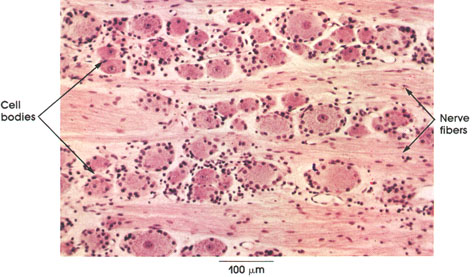

Ronald A. Bergman, Ph.D., Adel K. Afifi, M.D., Paul M. Heidger,
Jr., Ph.D.
Peer Review Status: Externally Peer Reviewed

Rhesus monkey, 10% formalin, H. & E., 162 x.
Cell bodies: Unipolar and ovoid or spherical in shape. Note the variation in size and density of staining of the large "clear" cells and the more numerous, small, densely staining "obscure" cells. See also Plates 101 and 102. Each ganglion cell is surrounded by deeply stained nuclei of the capsule cells (satellite cells).
Nerve fibers: These are shown separating groups of nerve cells. They constitute central and peripheral axons of ganglion cells. Central and peripheral axons are branches of a single extension of the sensory neuron cell body (see Plates 103 and 106). The peripheral processes convey impulses from sensory receptors, and, since they conduct toward the cell body, they function like a dendrite. The central processes carry impulses to the central nervous system (spinal cord). No synapses occur in the dorsal root ganglion.
Next Page | Previous Page | Section Top | Title Page
Please send us comments by filling out our Comment Form.
All contents copyright © 1995-2024 the Author(s) and Michael P. D'Alessandro, M.D. All rights reserved.
"Anatomy Atlases", the Anatomy Atlases logo, and "A digital library of anatomy information" are all Trademarks of Michael P. D'Alessandro, M.D.
Anatomy Atlases is funded in whole by Michael P. D'Alessandro, M.D. Advertising is not accepted.
Your personal information remains confidential and is not sold, leased, or given to any third party be they reliable or not.
The information contained in Anatomy Atlases is not a substitute for the medical care and advice of your physician. There may be variations in treatment that your physician may recommend based on individual facts and circumstances.
URL: http://www.anatomyatlases.org/